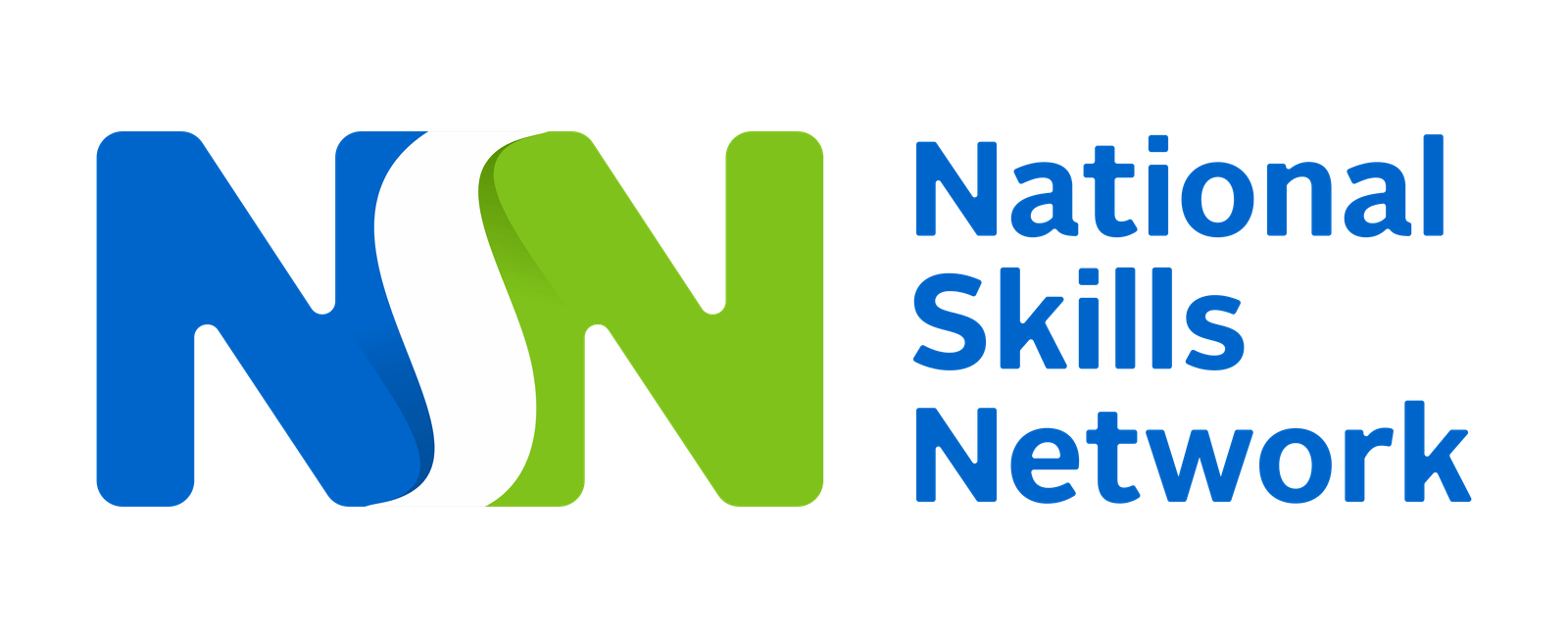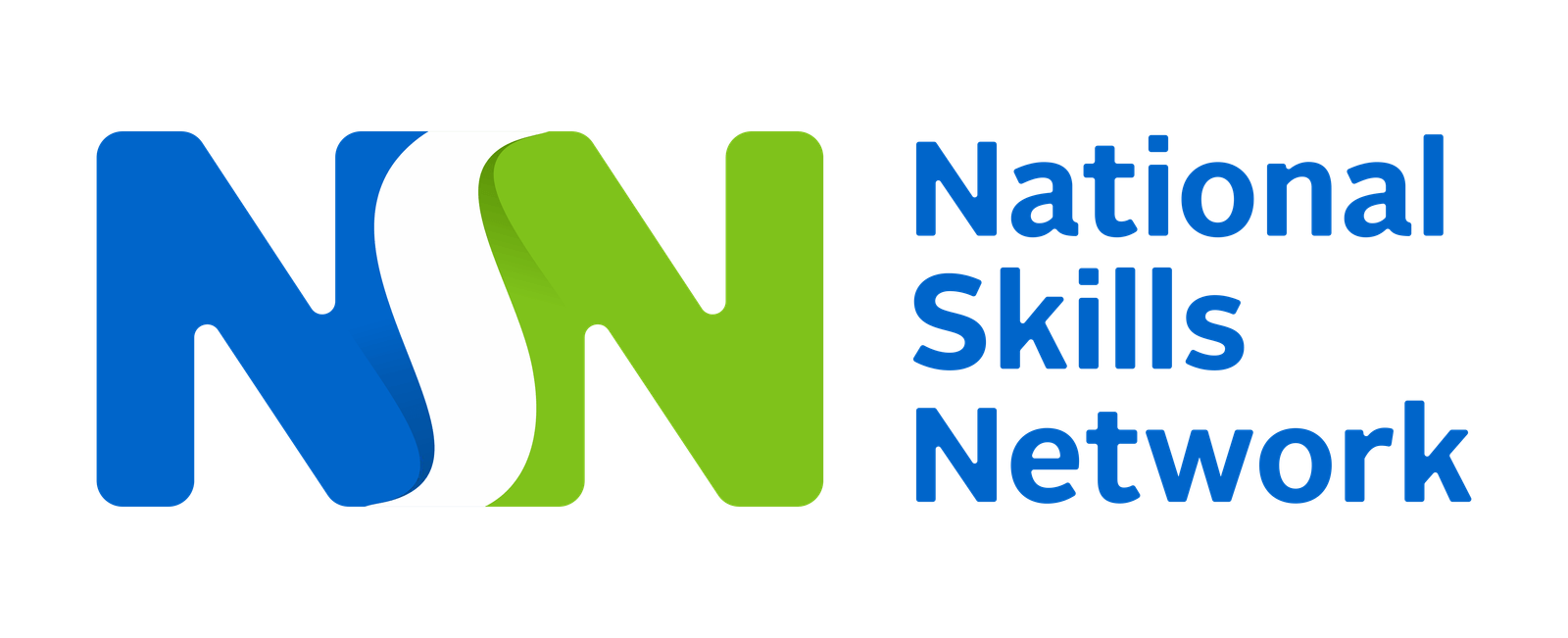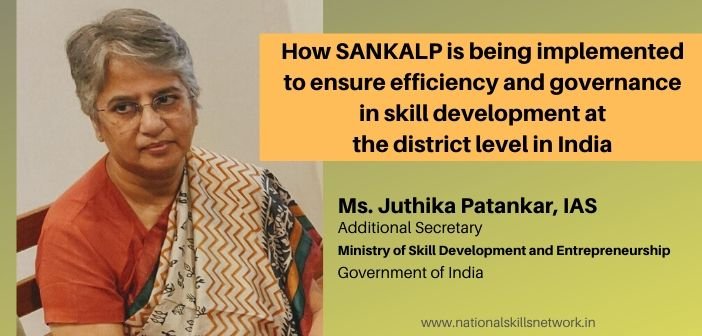SANKALP (Skills Acquisition and Knowledge Awareness for Livelihood Promotion) is a Rs 4,455 crore centrally-sponsored scheme including Rs. 3,300 crore loan support from World Bank. The Scheme will address the need for national level architecture to facilitate convergence, efficiency in governance and regulation by setting up district-level infrastructure. We spoke to Ms. Juthika Patankar, IAS, Additional Secretary, Ministry of Skill Development and Entrepreneurship (MSDE), to get a deeper understanding of the program and what the government would like to achieve through successful implementation of the scheme.
Q: Could you tell us about the highlights of the SANKALP scheme implemented by the Ministry and how is it different from STRIVE (Skill Strengthening for Industrial Value Enhancement)?
A: As we all know, MSDE implements many skill training programs that can be broadly classified into long-term and short-term trainings. The long-term training programs run by Director General of Training (DGT) comprise courses that are usually one to 3 years and are imparted through Industrial Training Institute (ITIs), largely in the manufacturing sector. STRIVE is focused on improving the long-term programs.
SANKALP is designed to strengthen the short-term training programs. The duration of these courses is usually 3 to 6 months. The short-term training is generally perceived to cater to skilling requirements of services sector such as Healthcare, Tourism and so on. Both SANKALP and STRIVE are externally aided projects and are assisted by the World Bank.
The goal of SANKALP is to strengthen skill development governance at State and district levels. The four key result areas identified under SANKALP are:
- Strengthening institutional mechanisms at national and state levels to guide planning, delivery and monitoring of market relevant training
- Improving quality and market relevance of skill development programs in terms of the content of the training program and its delivery
- Improving access to and inclusion of all socially disadvantaged groups like the women, SCs, STs, transgender, PwDs and others
- Expanding skills training through private-public partnerships (PPPs) by joint funding of innovative skill development projects for better outcomes
Q: How is the SANKALP program implemented at the grassroots level?
A: SANKALP is implemented to improve short-term training programs. We do this through pilot projects at the national level. These pilot projects are taken up to demonstrate how skill training can be improved qualitatively and in terms of inclusivity across various sectors. Besides, we have state incentive grants, given to states on the basis of their project proposals.

Our main focus is to achieve decentralization through District Skill Committees (DSCs). These District Skill Committees are mandated to do planning and skill training to reach maximum people vertically and horizontally.
For this, we follow a 3-tier structure – Centre, State and Districts. This structure has been advocated long ago through various committees. District Skill Planning is important to adequately reflect the local needs for skilling and aspirations. Most of the districts across country have DSCs, but are called with different names such as District Skill Development Committee, District Skill Development Authority etc. The members of these committees are District administration officials like District Employment officer, Fisheries officer, Agriculture officer, Panchayati Raj officer, Manager Lead bank, General Manager District Industries Centre etc. Members from industry and civil society organizations can also be co-opted under DSC.
We must galvanise and activate these committees to prepare the Annual District Skill Development Plan. This plan is prepared based on the economic potential of the District. This plan will help us in understanding what the youth’s aspirations in the district are. Based on which we can develop new possible trades according to the prospects of the employment. This eventually will improve the skill training in quality and outreach.
 Q: What are some of the challenges of the SANKALP program at the ground level?
Q: What are some of the challenges of the SANKALP program at the ground level?
A: In any skill training scenario there will be challenges like –
- The need to address youth aspirations
- Demand articulation of MSMEs and industry connect
- Making skill development opportunities accessible to all
In the context of SANKALP, the challenge is to make sure the officials of DSCs are adequately trained in the subjects like economic profiling, labour relations, and a gamut of activities under skill training management to help them come up with a cohesive Skill Development Plan. In absence of these capacities and owing to structural issues we don’t have fully functional DSCs and vibrant skill ecosystems across most of the districts.
Apart from investing in capacity building of the DSCs, SANKALP also plans to establish working sub-committees which shall act as secretariat to the main committee. The secretariat will prepare a plan involving all the stakeholders and present it before the main committee. This plan after adoption by the DSC will be subsumed into larger state level plan for skill development. This will guide policy on skill development at the state as well as at the national level.
Related article: SANKALP and STRIVE Schemes all set to accelerate Skill India Mission – Read more: https://nationalskillsnetwork.in/sankalp-strive-schemes/
Q: How is the training taking place at present?
A: We use a multi-pronged strategy for training. Workshops are undertaken at district levels across the states. SANKALP team would identify resource persons, and themselves address the members of the DSCs, train them to prepare the District Skill Plan. We also involve national level and state level academic and research institutions like NIRD and SIRDs, State Academics of Administration to provide platform and academic content for training. We have partnered with National Instructional Media Institute (NIMI) to help in content development.
Most importantly, we have a tie-up with IIM Bangalore for implementing Mahatma Gandhi National Fellowship. In the first instance, 75 persons would be selected for as many districts across 6 states and would get trained on issues related to public policy, planning , budgeting and vocational education at IIM Bangalore. They would spend large part of the two years’ duration in the districts. They would be valuable resource persons for planning, implementation and monitoring for skill development along with DSC members.
Q: How does SANKALP benefit the private training partners and trainers?
A: Training Partner benefits both directly and indirectly. SANKALP is working on alternative models of Training the Trainers (ToT) by leveraging expertise and resources of industry clusters and institutions of higher learning. Interventions have been planned for various activities in skill development value chain such as mobilization, counselling, content, employer engagement. These interventions will have ecosystem-wide impact and benefit trainees, trainers and training providers. Schemes like PMKVY would get strengthened by adoption of better processes and more robust monitoring at local levels. The major thrust under SANKALP is to move to demand-based skilling through decentralized planning.
Q: What is the role played by NSDC?
A: NSDC is both a supplementing and an implementing institution for MSDE. We look to their expertise, which they have built in terms of enhancing and augmenting the quality skill training and outreach. They are one of our strong partners in carrying out many activities under SANKALP. One of the important initiatives of NSDC under SANKALP is, development of Skill India portal to better represent Skill training related numbers across sectors and states.
Q: Tell us more about addressing youth aspirations and connecting them with what the industry wants?
A: Our strategy of decentralization and implementation of the program at the district level is a step towards addressing the youth aspirations. Along with district level plans, we would also want to decentralize it to Gram Panchayat development levels. By this we would be reaching out to every person in the villages to understand the aspirations of the youngsters at the grassroots level. This would also involve community based mobilisation and counselling using more scientific methods. As DSCc would also engage with all the stakeholders like the MSMEs and other employers, influencers, parents of prospective trainees etc, they would be able to gauge demand and supply better
Q: Does SANKALP program also address the issue of migration?
A: As of now we haven’t addressed the issue of migration intensively or extensively. But we have been encouraging the DSCs to conduct studies on migration as a part of SANKALP. These studies would include to study how many people are going out, how many are coming in, how much of the migration is distressed and how much of it aspirational. We hope to be able to capture it eventually.
Q: Could you explain us about the funding aspect of the SANKALP program?
A: As I have mentioned it earlier, SANKALP is a World Bank loan-assisted project. The World Bank has listed Disbursement Linked Indicators (DLIs), based on the achievement of certain parameters. We get the money as a part of loan assistance when the number of persons trained, certified, employed, number of women included and so on meets the expectations.
Based on fulfilment of the indicators, the funds are released. The World Bank gives the funds to the Central Government. These funds are given to the State Governments based on their project proposal. The funds from the Government of India plus the resources raised by the State helps it in implementing the program. This is the general funding part of it.
The Government of India, through that loan and the resources raised by states would be utilising the funds to implement SANKALP. This works like any World Bank project under outcome based funding mechanism. However, our big concern is funding for the DSCs. This is a challenge and needs to be addressed. If we want the District Committees to make the skill plan, effectively implement and monitor , these committees would themselves need finances. How we are going to raise them is the real concern. We are exploring possibilities of funding this through planning and monitoring components of schemes like PMKVY.
Subscribe to our YouTube channel for more updates:
Subscribe on YouTube














Comments 5